2011年《随堂优化训练》英语 新课标北师大版 必修5 unit 14 lesson 3 nine to five [配套课件]
文档属性
| 名称 | 2011年《随堂优化训练》英语 新课标北师大版 必修5 unit 14 lesson 3 nine to five [配套课件] |
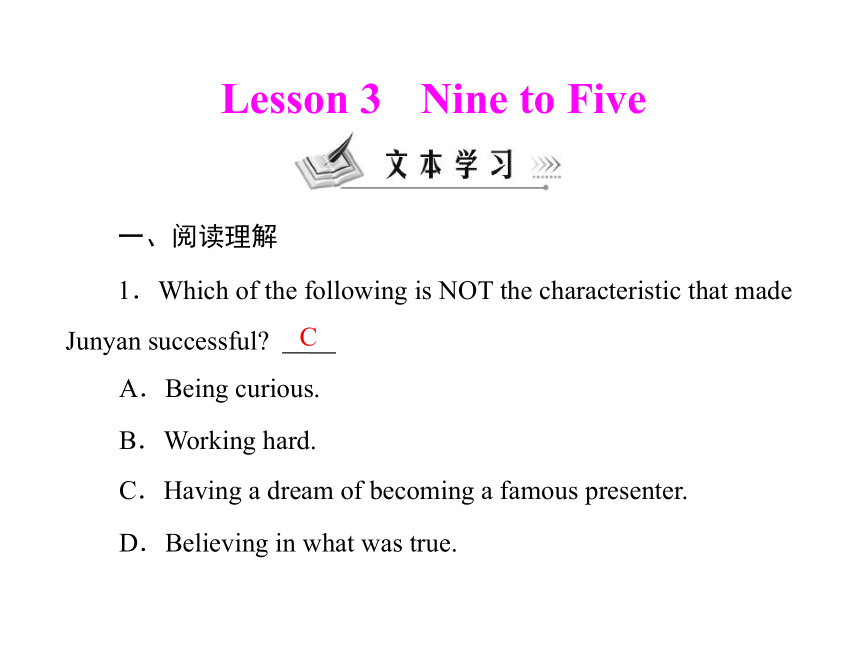
|
|
| 格式 | rar | ||
| 文件大小 | 112.7KB | ||
| 资源类型 | 教案 | ||
| 版本资源 | 北师大版 | ||
| 科目 | 英语 | ||
| 更新时间 | 2011-07-17 00:00:00 | ||
图片预览

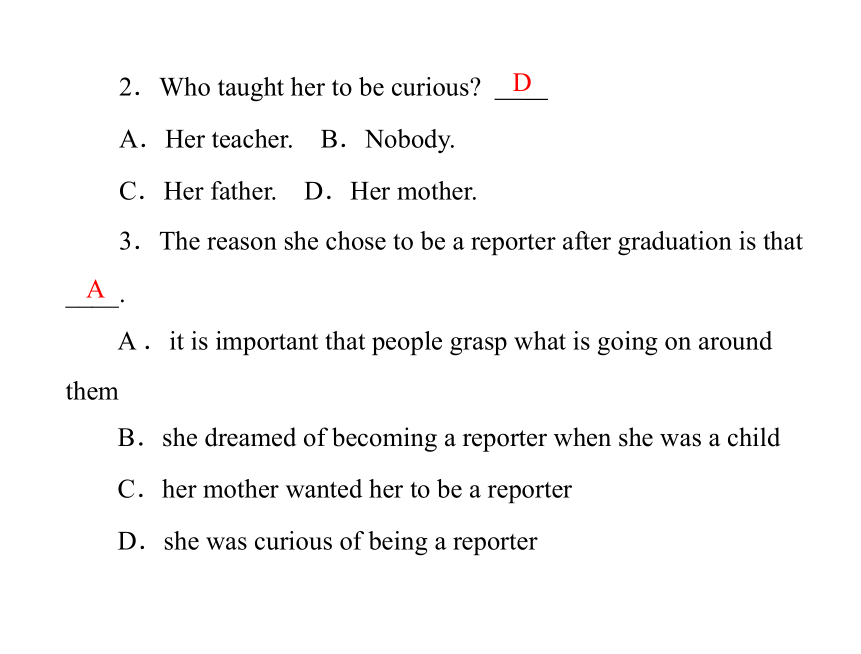
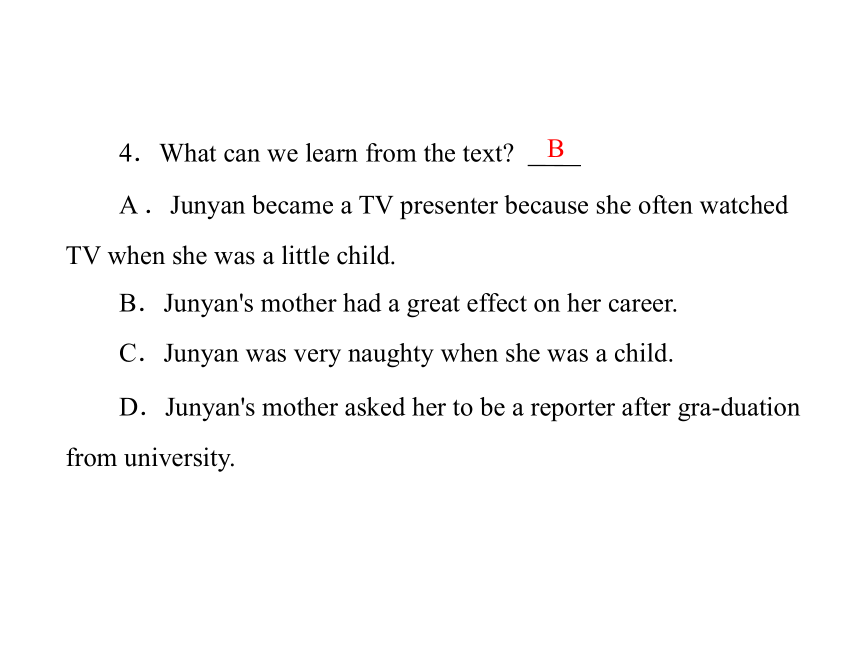
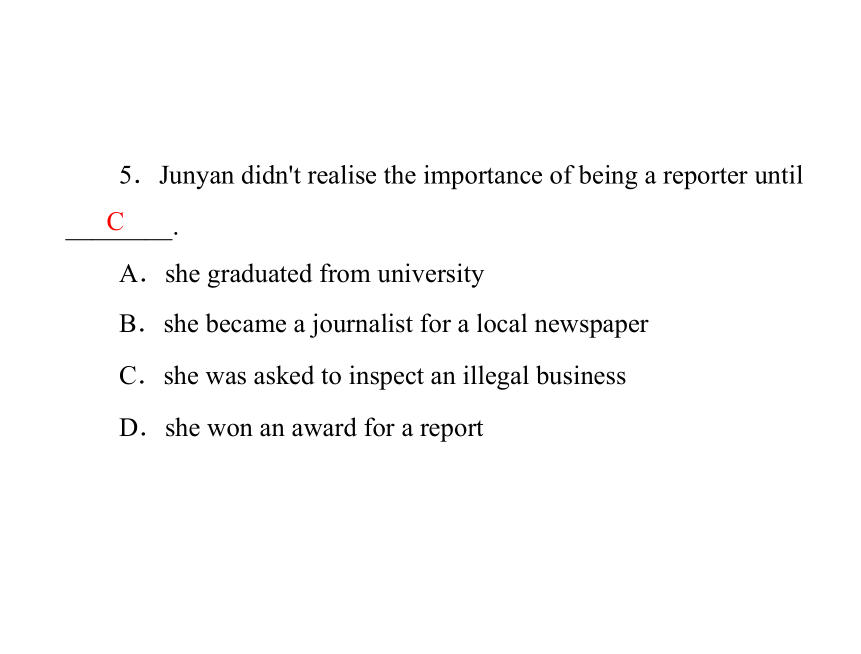
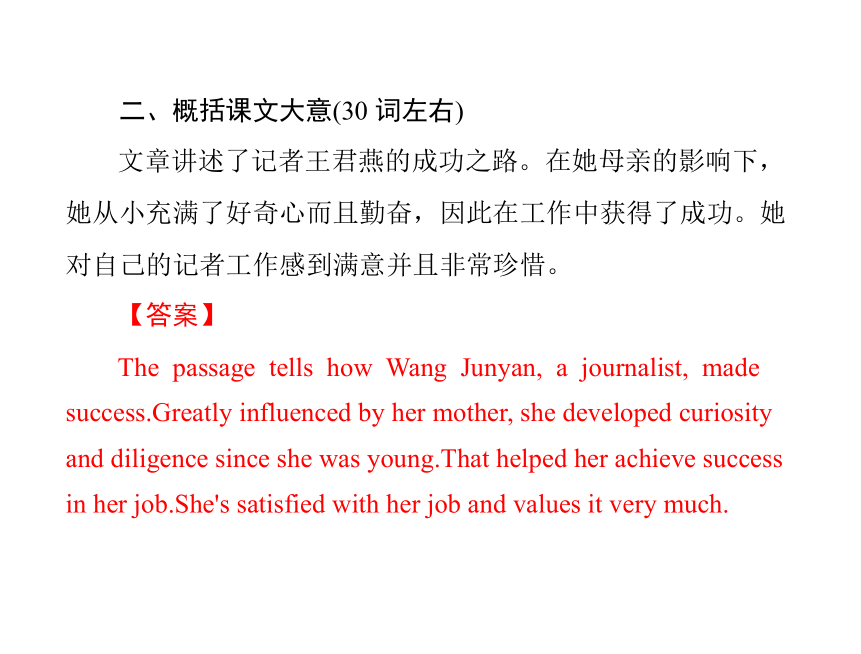

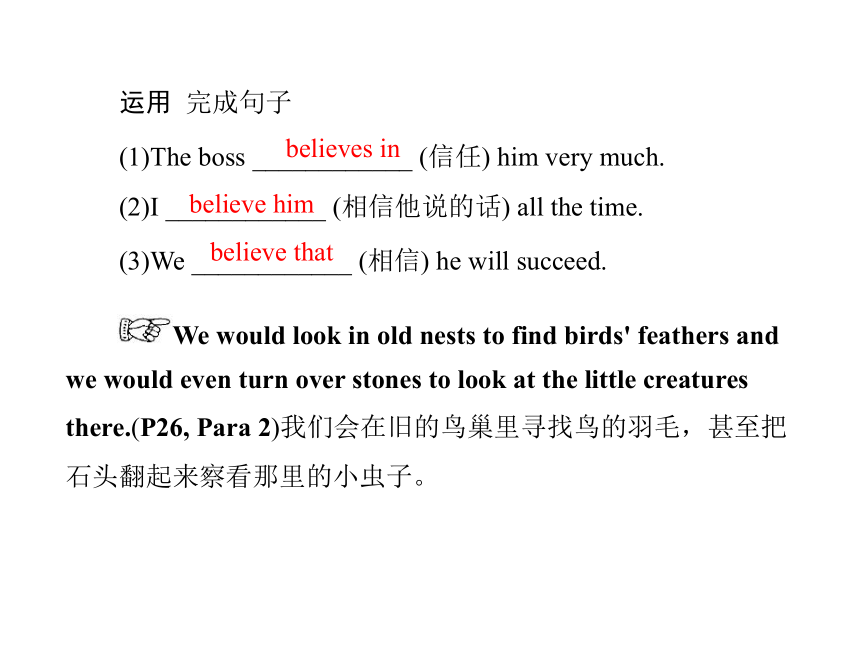
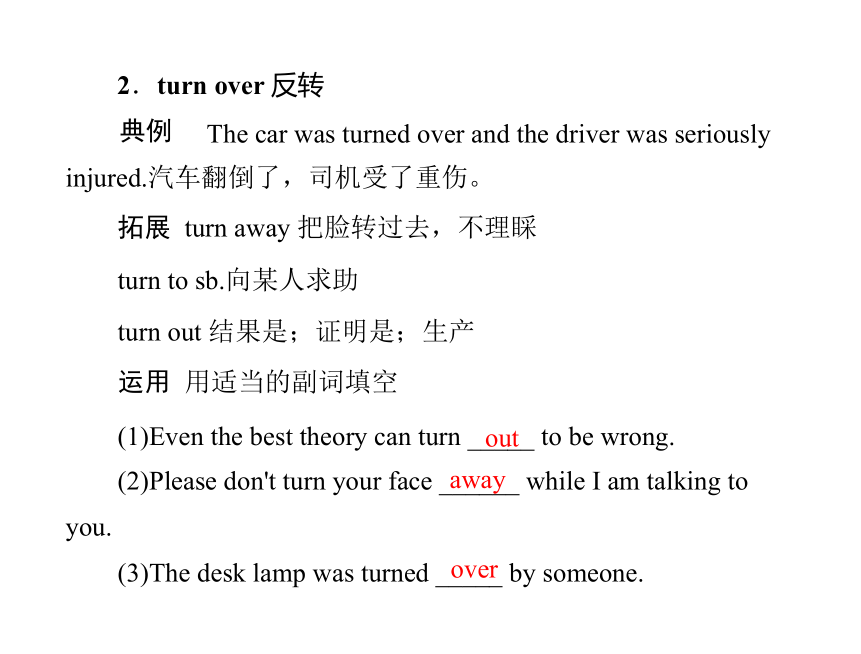
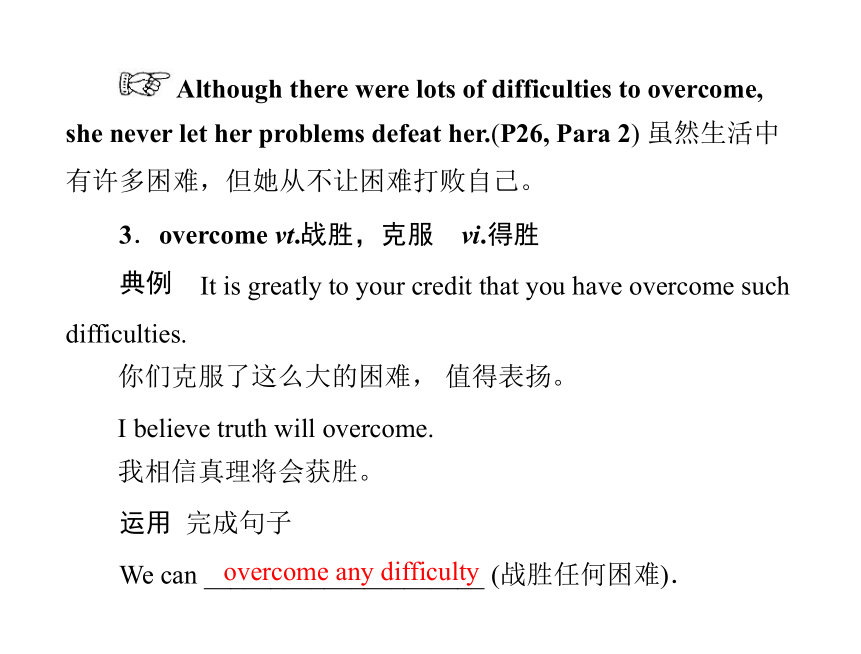
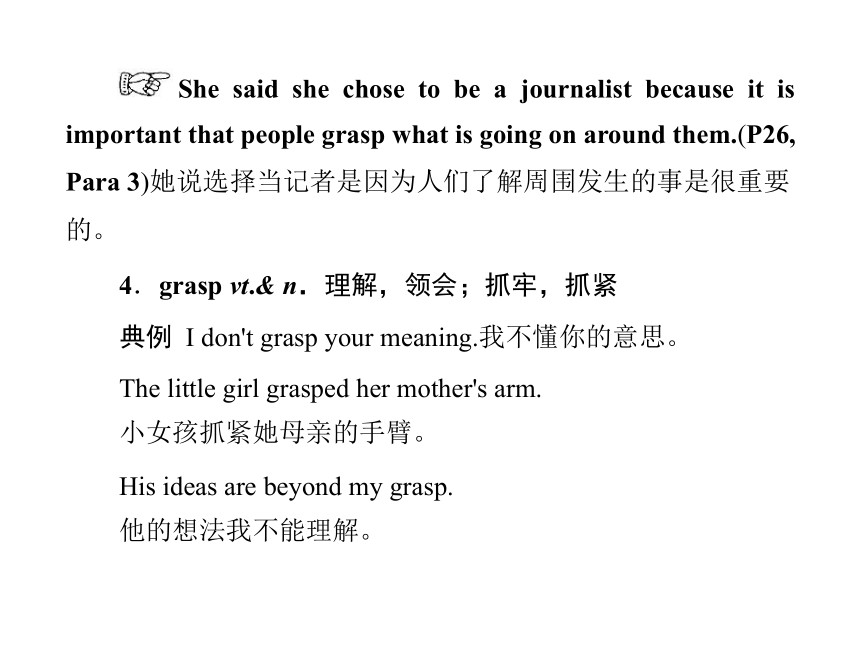
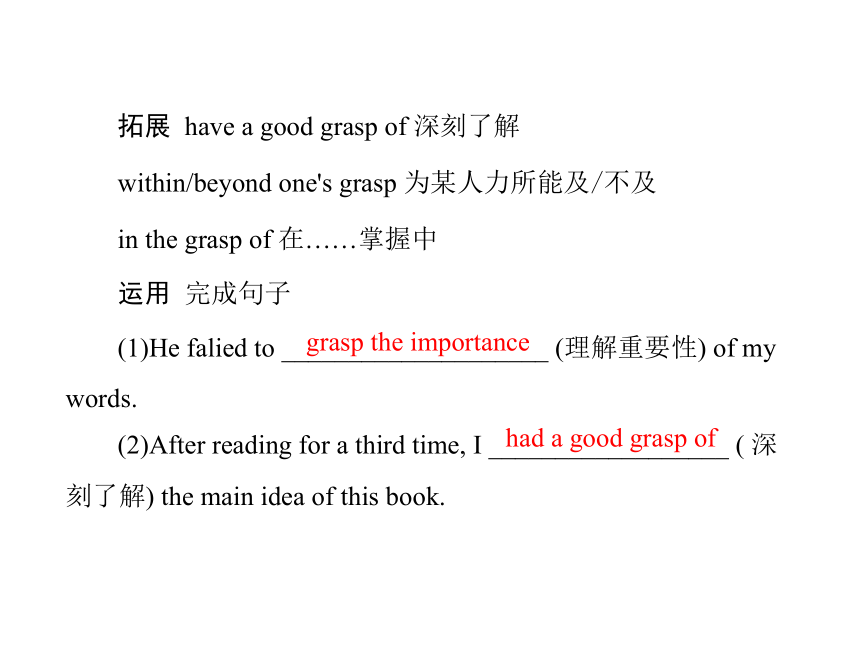
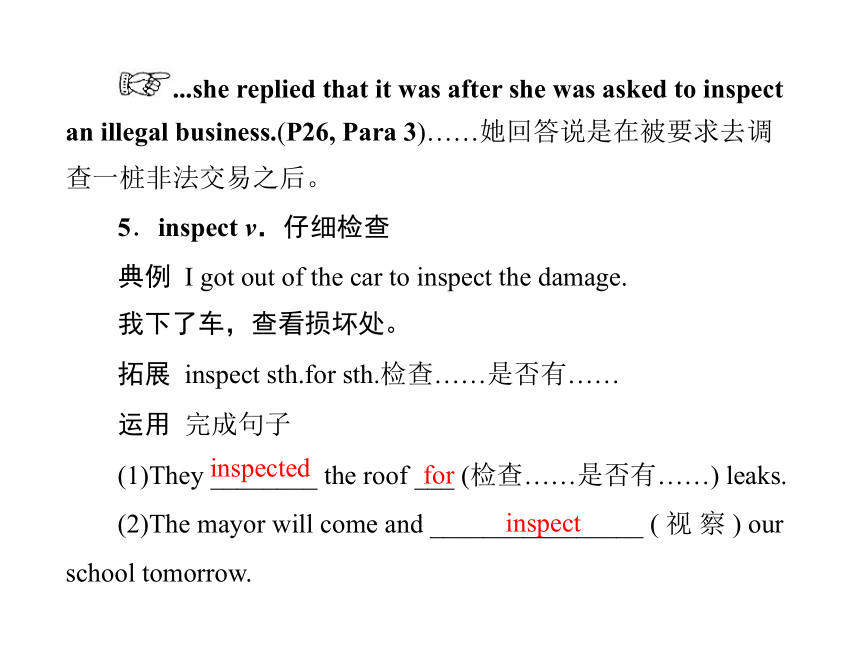
文档简介
(共38张PPT)
Lesson 3
Nine to Five
一、阅读理解
1.Which of the following is NOT the characteristic that made
Junyan successful
A.Being curious.
C
B.Working hard.
C.Having a dream of becoming a famous presenter.
D.Believing in what was true.
2.Who taught her to be curious
A.Her teacher. B.Nobody.
D
C.Her father. D.Her mother.
3.The reason she chose to be a reporter after graduation is that
____.
A
A .it is important that people grasp what is going on around
them
B.she dreamed of becoming a reporter when she was a child
C.her mother wanted her to be a reporter
D.she was curious of being a reporter
4.What can we learn from the text
A .Junyan became a TV presenter because she often watched
TV when she was a little child.
B.Junyan's mother had a great effect on her career.
C.Junyan was very naughty when she was a child.
D.Junyan's mother asked her to be a reporter after gra-duation
from university.
B
5.Junyan didn't realise the importance of being a reporter until
________.
C
A.she graduated from university
B.she became a journalist for a local newspaper
C.she was asked to inspect an illegal business
D.she won an award for a report
二、概括课文大意(30 词左右)
文章讲述了记者王君燕的成功之路。在她母亲的影响下,
她从小充满了好奇心而且勤奋,因此在工作中获得了成功。她
对自己的记者工作感到满意并且非常珍惜。
【答案】
The passage tells how Wang Junyan, a journalist, made
success.Greatly influenced by her mother, she developed curiosity
and diligence since she was young.That helped her achieve success
in her job.She's satisfied with her job and values it very much.
...and she told me that being curious, working hard,
and believing in what was true made her the success she is
today.(P26, Para 1)……她告诉我好奇、勤奋、坚持真理使她成
为今天这样成功的人。
1.believe in 信任,信仰
典例 Christians believe in Jesus.基督徒信仰耶稣。
拓展 believe sb./sth.相信某人的话/某事是真的
believe that...相信……
运用 完成句子
believes in
believe him
(1)The boss ____________ (信任) him very much.
(2)I ____________ (相信他说的话) all the time.
(3)We ____________ (相信) he will succeed.
believe that
We would look in old nests to find birds' feathers and
we would even turn over stones to look at the little creatures
there.(P26, Para 2)我们会在旧的鸟巢里寻找鸟的羽毛,甚至把
石头翻起来察看那里的小虫子。
典例
The car was turned over and the driver was seriously
injured.汽车翻倒了,司机受了重伤。
拓展 turn away 把脸转过去,不理睬
turn to sb.向某人求助
turn out 结果是;证明是;生产
运用 用适当的副词填空
(1)Even the best theory can turn _____ to be wrong.
(2)Please don't turn your face ______ while I am talking to
you.
(3)The desk lamp was turned _____ by someone.
out
away
over
2.turn over 反转
Although there were lots of difficulties to overcome,
she never let her problems defeat her.(P26, Para 2) 虽然生活中
有许多困难,但她从不让困难打败自己。
3.overcome vt.战胜,克服
vi.得胜
典例
It is greatly to your credit that you have overcome such
difficulties.
你们克服了这么大的困难, 值得表扬。
I believe truth will overcome.
我相信真理将会获胜。
运用 完成句子
overcome any difficulty
We can _____________________ (战胜任何困难).
She said she chose to be a journalist because it is
important that people grasp what is going on around them.(P26,
Para 3)她说选择当记者是因为人们了解周围发生的事是很重要
的。
4.grasp vt.& n.理解,领会;抓牢,抓紧
典例 I don't grasp your meaning.我不懂你的意思。
The little girl grasped her mother's arm.
小女孩抓紧她母亲的手臂。
His ideas are beyond my grasp.
他的想法我不能理解。
拓展 have a good grasp of 深刻了解
within/beyond one's grasp 为某人力所能及/不及
in the grasp of 在……掌握中
运用 完成句子
(1)He falied to ____________________ (理解重要性) of my
words.
(2)After reading for a third time, I __________________ ( 深
刻了解) the main idea of this book.
grasp the importance
had a good grasp of
...she replied that it was after she was asked to inspect
an illegal business.(P26, Para 3)……她回答说是在被要求去调
查一桩非法交易之后。
5.inspect v.仔细检查
典例 I got out of the car to inspect the damage.
我下了车,查看损坏处。
拓展 inspect sth.for sth.检查……是否有……
运用 完成句子
(1)They ________ the roof ___ (检查……是否有……) leaks.
(2)The mayor will come and ________________ ( 视 察 ) our
school tomorrow.
inspected
inspect
for
This paid off because she won an award for the
report.(P26, Para 4)她的坚持获得了成功,因为她的报道获奖
了。
6.pay off 得到好结果;取得成功;付清,还清,偿还
典例 Did your daring plan pay off
你那项大胆的计划成功了吗?
You must pay off your old loan before you can obtain a new
one.你必须还清旧账,然后才能再借款。
拓展 pay back 报复;偿还
pay for 付钱
运用 用适当的介词或副词填空
(1)I'm glad that his effort at last paid ___.
(2)How much did you pay ___ your car
for
(3)I have paid him ____ for the trick he played on me.
back
I discovered then that as long as I am committed and
never give up I will be able to produce high quality reports.(P26,
Para 4)那时我发现,只要全身心投入,永不放弃,我就能写出
高质量的报道。
7.commit vt.投入;犯(罪),做(错事等)
典例 As a doctor, he's very committed.
作为医生他是很敬业的。
off
I committed an error in handling the business.
我在处理这项业务时犯了一个错误。
拓展 commit oneself to 致力于……
commit a crime 犯罪
commit suicide 自杀
commit an error 出差错,犯错误
运用 完成句子
(1)Get ready to __________________ (全身心投入) the work.
(2)She failed in her second attempt to _________________
(自杀).
commit yourself to
commit suicide
She hesitated and then told me that the year before
she had broken her wrist...(P27, Ex 5)她犹豫了一会儿,然后告
诉我在她腕关节受伤之前的那一年……
8.hesitate v.犹豫,踌躇
点拨 (1)作不及物动词,常与介词 about 连用。如:
Don't hesitate about that.Do it at once.
对于那件事不要再犹豫了,马上去做吧。
(2)作及物动词,还可意为“有疑虑;不愿意”,后常接动
词不定式。如:
He did not hesitate to ask her to sit beside him.
他毫不犹豫地请她坐在他身旁。
运用 完成句子
(1)If you have any questions, ______________ ( 不 要 犹 豫 )
ask.
(2)She _____________ (对……犹豫不决) the choice between
the two dresses.
don't hesitate to
hesitated about
本课时单词 拓展词汇 构词法小结
inspect v.
仔细 检查 inspection n.检查,
视查
inspector n.检查员,
巡视员 1.-tion 和-ance/-ence 为名词后
缀,表示“性质,状态,行为,
过程,结果”。如:translation
翻译; performance 表演。
2.-or 为名词后缀,表示人或行
为者。如:actor 演员。3.il-
加在以 l 开头的形容词前,表
示否定。如:illogical 不合逻
辑的。
illegal adj.不合
法的,违法的 legal adj.合法的
existence n.
存在 exist v.存在,生存
existent adj.存在的
hesitate v.
犹豫,踌躇 hesitation n.犹豫
运用 用所给单词的适当形式填空
1 .A ticket ________ (inspect) got on the train and began to
________ (inspect) our tickets.
inspector
inspect
2 . Elevators must undergo an annual safety ________
(inspect).
inspection
3.When you drive, you must not exceed the ________ (illegal)
limit.
legal
existence
4.We do not believe in the ________ (exist) of ghosts.
5.Most scientists believe that water doesn't ________ (exist)
on the surface of the moon.
exist
6.Without any ________ (hesitate), he jumped into the river to
save the drowning child.
hesitation
1 .I never thought about going on TV because my family
didn't even have one until I was in junior high school! (P26,
Para 1)我没想过能上电视,因为直到我上初中的时候家里才有
电视!
点拨
not...until 意为“直到……才”,用于引导时间状语
从句。如:
He didn't go to school until he was seven.
他直到七岁才去上学。
拓展 not...until 句型有下列变换形式:
(1)将 not...until 从句提到句首,主句要倒装。如:
Not until he was seven did he go to school.
他直到七岁才去上学。
(2)将 not...until 从句置于“it was...that”之间,构成强调句。
如:
not until yesterday
It was not until he was seven that he went to school.
直到七岁他才去上学。
运用 同义句转换
we knew about it
(1)We didn't know about it until yesterday.
It was _______________ that _________________.
(2)He doesn't come until late in the evening.
Not until late in the evening _______________.
does he come
2 . ...being curious, working hard, and believing in what
was true made her the success she is today.(P26, Para 1)……好
奇、勤奋、坚持真理使她成为今天这样成功的人。
点拨
本句中 make 后接名词作宾补,意为“使……成
为……”。如:
They made him their team leader.他们让他做队长。
拓展 make 作使役动词的其他用法为:
(1)make+宾语+省略 to 的动词不定式
注意:作 make 的宾补的不定式要省略 to,如果 make 用于
被动语态,则要加上 to。如:
I couldn't make my car start this morning.
今天早上我的汽车发动不起来了。
The students were made to do the homework the whole night.
学生们被迫整个晚上都做作业。
(2)make+宾语+过去分词
过去分词作宾补表示宾补的动作与宾语是逻辑上的动宾关
系。如:
I need to make my car repaired.
我需要修理我的车。
(3)make+宾语+形容词
形容词作宾补表示宾语所处的状态或性质。如:
What he said made her angry.
他说的话让她很生气。
运用 用所给单词的适当形式填空
happy
(1)Seeing him happy made me ________ (happy) too.
(2)When I first come to America, I had a lot of difficulty
making myself ________ (understand).
(3)He made me ________ (repeat) it.
understood
(4)We made her our ________ (monitor).
monitor
repeat
3 . It was my mother who taught me to be curious.(P26,
Para 2)是妈妈教会我要有好奇心。
点拨 本句为强调句型,其结构为“It was/is+被强调的部
分+that/who+其他成分”。该句型可用于强调主语、宾语、表
语和状语,但不可以强调谓语。当强调主语且指人时,可用
that/who 引导;其他情况只能用 that。如:
It was Mr.Smith who/that taught me chemistry in middle
school.
在中学时,正是史密斯先生教我化学。
It was yesterday that I lost my book.
正是在昨天我丢了我的书。
运用 用强调句型改写句子
It is
that/who
(1)My mother takes me to school every morning.
___ my mother ______ takes me to school every morning.
(2)Einstein was able to come back to his research work again
after the war was over.
It was
that
______ after the war was over ____ Einstein was able to come
back to his research work again.
4 .I asked her if there was any special moment that made
her realise this and she replied that it was after she was asked to
inspect an illegal business.(P26,Para 3)我问她有没有什么特殊
的时刻使她认识到这一点,她回答说是在被要求去调查一桩非
法交易之后。
点拨
这是一个由 and 连接的并列复合句,主干部分是“I
asked her...and she replied...”。and 前面的分句包含一个由 if 引导
的宾语从句,宾语从句中又包含一个由 that 引导的定语从句,
其中从句的引导词 that 不能用 which 来代替,因为其先行词
special moment 被 any 修饰; and 后面的分句包含了一个由 that
引导的宾语从句,而且宾语从句还省略了一些成分,完整的句
子应是“it was after she was asked to inspect an illegal business that
she realised this.”。
运用 完成句子
company
I wrote to Lincoln to ask
________ (他是否知道公司举行的聚会), ________________ (他
回信说) the pressure of work kept him from joining them in most
of the parties.
and he replied that
if he knew the party held by the
I wrote to Lincoln to ask
________ (他是否知道公司举行的聚会), ________________ (他
回信说) the pressure of work kept him from joining them in most
asked her...and she replied...”。and 前面的分句包含一个由 if 引导
的宾语从句,宾语从句中又包含一个由 that 引导的定语从句,
其中从句的引导词 that 不能用 which 来代替,因为其先行词
special moment 被 any 修饰; and 后面的分句包含了一个由 that
引导的宾语从句,而且宾语从句还省略了一些成分,完整的句
子应是“it was after she was asked to inspect an illegal business that
she realised this.”。
间接引语(二)
一、直接引语为陈述句时的变化
当直接引语为陈述句,变为间接引语时要用 that 引导(常可
省略) ,主句的谓语动词可直接用引语中的 say/said, 也可用
tell/told 来代替。当主句的谓语动词为现在时态,间接引语中的
谓语动词时态不变;当主句的谓语动词为过去时态,间接引语
中的谓语动词一般按下列规律变化:
直接引语 间接引语
一般现在时 一般过去时
现在进行时 过去进行时
现在完成时 过去完成时
一般将来时 过去将来时
现在完成进行时 过去完成进行时
一般过去时 过去完成时
过去进行时 不变
过去完成时 不变
如:
“I'm preparing my lessons,” she said.
她说:“我在准备功课。”
→She said that she was preparing her lessons.
她说她在准备功课。
I said to them, “You'll be disappointed at the news.”
我对他们说:“听到这个消息你们会失望的。”
→I told them that they would be disappointed at the news. 我告诉他
们,听到这个消息他们会失望的。
He said to me, “Jane spent all her time doing that.”
他对我说:“简做那件事花了她全部的时间。”
→He told me that Jane had spent all her time doing that.他告诉我简
做那件事花了她全部的时间。
注意:
(1)直接引语中的谓语动词为一般过去时,如与一个具体的
表示过去某年、某月、某日的时间状语连用,变为间接引语时
则不用改变时态。如:
My father said to me, “I read the book in 1986.”
我父亲对我说:“我在 1986 年读了这本书。”
→My father told me he read the book in 1986.
我父亲告诉我他于 1986 年读了这本书。
(2)直接引语表达的意思是客观真理时,变为间接引语时时
态不变。如:
The teacher said to us, “The earth goes around the sun.” 老师
对我们说:“地球绕着太阳转。”
→The teacher told us that the earth goes around the sun. 老师
告诉我们地球绕着太阳转。
(3)如果直接引语中的情态动词没有过去时的形式(ought to,
had better, used to 等 ) 或 已 经 是 过 去 时 的 形 式 (could, should,
would, might 等)时,改为间接引语则不再变化。如:
Peter said, “You had better come here tomorrow.”
彼得说:“你最好明天来这儿。”
→Peter said I had better go there tomorrow.
彼得说我明天最好去那儿。
二、直接引语为问句时的变化
1.间接引语中要用陈述句的语序,且时态的变化仍遵循上
述规律。如:
She asked, “What is it What's going to happen now?”
她问:“那是什么?又要发生什么事了?”
→She asked what it was and what was going to happen then.
她问那是什么,又要发生什么事了。
2.特殊疑问词要保留。如:
The boy was wondering, “How does the computer work ?”
那男孩感到好奇:“电脑是怎样工作的?”
→The boy was wondering how the computer worked.
那男孩对电脑是怎么工作的感到好奇。
“Why do you speak English so fluently?” I said to him.
我对他说:“为什么你的英语说得如此流利?”
→I asked him why he spoke English so fluently.
我问他,他的英语为什么说得如此流利。
3.一般、选择或反意疑问句在改为间接引语时要加 whether
或 if。如:
“Is there anything wrong, Madam ?” asked the policeman.
警察问:“夫人,出了什么事吗?”
→The policeman asked the woman whether there was
anything wrong.警察问那个妇女是否出了什么事。
He asked me, “Do you study English or French?”
他问我:“你学的是英语还是法语?”
→He asked me whether I studied English or French.
他问我学的是英语还是法语。
He said, “You are interested in English, aren't you?”
他说:“你对英语感兴趣,是吗?”
→He asked whether I was interested in English.
他问我是否对英语感兴趣。
一、 同义句转换
if/whether
was
they had visited
1.She said, “Are you from the south?”
the week before
She asked ______________ I ______ from the south.
2.Susan said to me, “We visited the Red Star Farm last week.”
Susan told me that ________________ the Red Star Farm
________________.
told
travels
told
had found his
3.Paul said to us, “Light travels faster than sound.”
Paul _____ us that light ______ faster than sound.
4.“I've found my wallet,” he said to me.
He ______ me that he ______________ wallet.
how soon my
5.“How soon will your mother come back?” he asked me.
He asked me ____________ mother _______ come back.
would
二、将下列句子改为间接引语
1.“I was reading the book the whole day yesterday,” said
Mary.
Mary said that she was reading the book the whole day the
day before.
2.He said, “You should take exercise every day.”
3.The history teacher said to them, “The Chinese Communist
Party was founded on July 1st, 1921.”
The history teacher told them that the Chinese Communist
Party was founded on July 1st, 1921.
He said I should take exercise every day.
4 .“Are you sorry for what you have done ?” The mother
asked the naughty boy.
The mother asked the naughty boy if/whether he was sorry
for what he had done.
5.She asked, “Who did you meet at the station two hours ago,
Mr. Li?”
She asked Mr.Li who he had met at the station two hours
before.
Lesson 3
Nine to Five
一、阅读理解
1.Which of the following is NOT the characteristic that made
Junyan successful
A.Being curious.
C
B.Working hard.
C.Having a dream of becoming a famous presenter.
D.Believing in what was true.
2.Who taught her to be curious
A.Her teacher. B.Nobody.
D
C.Her father. D.Her mother.
3.The reason she chose to be a reporter after graduation is that
____.
A
A .it is important that people grasp what is going on around
them
B.she dreamed of becoming a reporter when she was a child
C.her mother wanted her to be a reporter
D.she was curious of being a reporter
4.What can we learn from the text
A .Junyan became a TV presenter because she often watched
TV when she was a little child.
B.Junyan's mother had a great effect on her career.
C.Junyan was very naughty when she was a child.
D.Junyan's mother asked her to be a reporter after gra-duation
from university.
B
5.Junyan didn't realise the importance of being a reporter until
________.
C
A.she graduated from university
B.she became a journalist for a local newspaper
C.she was asked to inspect an illegal business
D.she won an award for a report
二、概括课文大意(30 词左右)
文章讲述了记者王君燕的成功之路。在她母亲的影响下,
她从小充满了好奇心而且勤奋,因此在工作中获得了成功。她
对自己的记者工作感到满意并且非常珍惜。
【答案】
The passage tells how Wang Junyan, a journalist, made
success.Greatly influenced by her mother, she developed curiosity
and diligence since she was young.That helped her achieve success
in her job.She's satisfied with her job and values it very much.
...and she told me that being curious, working hard,
and believing in what was true made her the success she is
today.(P26, Para 1)……她告诉我好奇、勤奋、坚持真理使她成
为今天这样成功的人。
1.believe in 信任,信仰
典例 Christians believe in Jesus.基督徒信仰耶稣。
拓展 believe sb./sth.相信某人的话/某事是真的
believe that...相信……
运用 完成句子
believes in
believe him
(1)The boss ____________ (信任) him very much.
(2)I ____________ (相信他说的话) all the time.
(3)We ____________ (相信) he will succeed.
believe that
We would look in old nests to find birds' feathers and
we would even turn over stones to look at the little creatures
there.(P26, Para 2)我们会在旧的鸟巢里寻找鸟的羽毛,甚至把
石头翻起来察看那里的小虫子。
典例
The car was turned over and the driver was seriously
injured.汽车翻倒了,司机受了重伤。
拓展 turn away 把脸转过去,不理睬
turn to sb.向某人求助
turn out 结果是;证明是;生产
运用 用适当的副词填空
(1)Even the best theory can turn _____ to be wrong.
(2)Please don't turn your face ______ while I am talking to
you.
(3)The desk lamp was turned _____ by someone.
out
away
over
2.turn over 反转
Although there were lots of difficulties to overcome,
she never let her problems defeat her.(P26, Para 2) 虽然生活中
有许多困难,但她从不让困难打败自己。
3.overcome vt.战胜,克服
vi.得胜
典例
It is greatly to your credit that you have overcome such
difficulties.
你们克服了这么大的困难, 值得表扬。
I believe truth will overcome.
我相信真理将会获胜。
运用 完成句子
overcome any difficulty
We can _____________________ (战胜任何困难).
She said she chose to be a journalist because it is
important that people grasp what is going on around them.(P26,
Para 3)她说选择当记者是因为人们了解周围发生的事是很重要
的。
4.grasp vt.& n.理解,领会;抓牢,抓紧
典例 I don't grasp your meaning.我不懂你的意思。
The little girl grasped her mother's arm.
小女孩抓紧她母亲的手臂。
His ideas are beyond my grasp.
他的想法我不能理解。
拓展 have a good grasp of 深刻了解
within/beyond one's grasp 为某人力所能及/不及
in the grasp of 在……掌握中
运用 完成句子
(1)He falied to ____________________ (理解重要性) of my
words.
(2)After reading for a third time, I __________________ ( 深
刻了解) the main idea of this book.
grasp the importance
had a good grasp of
...she replied that it was after she was asked to inspect
an illegal business.(P26, Para 3)……她回答说是在被要求去调
查一桩非法交易之后。
5.inspect v.仔细检查
典例 I got out of the car to inspect the damage.
我下了车,查看损坏处。
拓展 inspect sth.for sth.检查……是否有……
运用 完成句子
(1)They ________ the roof ___ (检查……是否有……) leaks.
(2)The mayor will come and ________________ ( 视 察 ) our
school tomorrow.
inspected
inspect
for
This paid off because she won an award for the
report.(P26, Para 4)她的坚持获得了成功,因为她的报道获奖
了。
6.pay off 得到好结果;取得成功;付清,还清,偿还
典例 Did your daring plan pay off
你那项大胆的计划成功了吗?
You must pay off your old loan before you can obtain a new
one.你必须还清旧账,然后才能再借款。
拓展 pay back 报复;偿还
pay for 付钱
运用 用适当的介词或副词填空
(1)I'm glad that his effort at last paid ___.
(2)How much did you pay ___ your car
for
(3)I have paid him ____ for the trick he played on me.
back
I discovered then that as long as I am committed and
never give up I will be able to produce high quality reports.(P26,
Para 4)那时我发现,只要全身心投入,永不放弃,我就能写出
高质量的报道。
7.commit vt.投入;犯(罪),做(错事等)
典例 As a doctor, he's very committed.
作为医生他是很敬业的。
off
I committed an error in handling the business.
我在处理这项业务时犯了一个错误。
拓展 commit oneself to 致力于……
commit a crime 犯罪
commit suicide 自杀
commit an error 出差错,犯错误
运用 完成句子
(1)Get ready to __________________ (全身心投入) the work.
(2)She failed in her second attempt to _________________
(自杀).
commit yourself to
commit suicide
She hesitated and then told me that the year before
she had broken her wrist...(P27, Ex 5)她犹豫了一会儿,然后告
诉我在她腕关节受伤之前的那一年……
8.hesitate v.犹豫,踌躇
点拨 (1)作不及物动词,常与介词 about 连用。如:
Don't hesitate about that.Do it at once.
对于那件事不要再犹豫了,马上去做吧。
(2)作及物动词,还可意为“有疑虑;不愿意”,后常接动
词不定式。如:
He did not hesitate to ask her to sit beside him.
他毫不犹豫地请她坐在他身旁。
运用 完成句子
(1)If you have any questions, ______________ ( 不 要 犹 豫 )
ask.
(2)She _____________ (对……犹豫不决) the choice between
the two dresses.
don't hesitate to
hesitated about
本课时单词 拓展词汇 构词法小结
inspect v.
仔细 检查 inspection n.检查,
视查
inspector n.检查员,
巡视员 1.-tion 和-ance/-ence 为名词后
缀,表示“性质,状态,行为,
过程,结果”。如:translation
翻译; performance 表演。
2.-or 为名词后缀,表示人或行
为者。如:actor 演员。3.il-
加在以 l 开头的形容词前,表
示否定。如:illogical 不合逻
辑的。
illegal adj.不合
法的,违法的 legal adj.合法的
existence n.
存在 exist v.存在,生存
existent adj.存在的
hesitate v.
犹豫,踌躇 hesitation n.犹豫
运用 用所给单词的适当形式填空
1 .A ticket ________ (inspect) got on the train and began to
________ (inspect) our tickets.
inspector
inspect
2 . Elevators must undergo an annual safety ________
(inspect).
inspection
3.When you drive, you must not exceed the ________ (illegal)
limit.
legal
existence
4.We do not believe in the ________ (exist) of ghosts.
5.Most scientists believe that water doesn't ________ (exist)
on the surface of the moon.
exist
6.Without any ________ (hesitate), he jumped into the river to
save the drowning child.
hesitation
1 .I never thought about going on TV because my family
didn't even have one until I was in junior high school! (P26,
Para 1)我没想过能上电视,因为直到我上初中的时候家里才有
电视!
点拨
not...until 意为“直到……才”,用于引导时间状语
从句。如:
He didn't go to school until he was seven.
他直到七岁才去上学。
拓展 not...until 句型有下列变换形式:
(1)将 not...until 从句提到句首,主句要倒装。如:
Not until he was seven did he go to school.
他直到七岁才去上学。
(2)将 not...until 从句置于“it was...that”之间,构成强调句。
如:
not until yesterday
It was not until he was seven that he went to school.
直到七岁他才去上学。
运用 同义句转换
we knew about it
(1)We didn't know about it until yesterday.
It was _______________ that _________________.
(2)He doesn't come until late in the evening.
Not until late in the evening _______________.
does he come
2 . ...being curious, working hard, and believing in what
was true made her the success she is today.(P26, Para 1)……好
奇、勤奋、坚持真理使她成为今天这样成功的人。
点拨
本句中 make 后接名词作宾补,意为“使……成
为……”。如:
They made him their team leader.他们让他做队长。
拓展 make 作使役动词的其他用法为:
(1)make+宾语+省略 to 的动词不定式
注意:作 make 的宾补的不定式要省略 to,如果 make 用于
被动语态,则要加上 to。如:
I couldn't make my car start this morning.
今天早上我的汽车发动不起来了。
The students were made to do the homework the whole night.
学生们被迫整个晚上都做作业。
(2)make+宾语+过去分词
过去分词作宾补表示宾补的动作与宾语是逻辑上的动宾关
系。如:
I need to make my car repaired.
我需要修理我的车。
(3)make+宾语+形容词
形容词作宾补表示宾语所处的状态或性质。如:
What he said made her angry.
他说的话让她很生气。
运用 用所给单词的适当形式填空
happy
(1)Seeing him happy made me ________ (happy) too.
(2)When I first come to America, I had a lot of difficulty
making myself ________ (understand).
(3)He made me ________ (repeat) it.
understood
(4)We made her our ________ (monitor).
monitor
repeat
3 . It was my mother who taught me to be curious.(P26,
Para 2)是妈妈教会我要有好奇心。
点拨 本句为强调句型,其结构为“It was/is+被强调的部
分+that/who+其他成分”。该句型可用于强调主语、宾语、表
语和状语,但不可以强调谓语。当强调主语且指人时,可用
that/who 引导;其他情况只能用 that。如:
It was Mr.Smith who/that taught me chemistry in middle
school.
在中学时,正是史密斯先生教我化学。
It was yesterday that I lost my book.
正是在昨天我丢了我的书。
运用 用强调句型改写句子
It is
that/who
(1)My mother takes me to school every morning.
___ my mother ______ takes me to school every morning.
(2)Einstein was able to come back to his research work again
after the war was over.
It was
that
______ after the war was over ____ Einstein was able to come
back to his research work again.
4 .I asked her if there was any special moment that made
her realise this and she replied that it was after she was asked to
inspect an illegal business.(P26,Para 3)我问她有没有什么特殊
的时刻使她认识到这一点,她回答说是在被要求去调查一桩非
法交易之后。
点拨
这是一个由 and 连接的并列复合句,主干部分是“I
asked her...and she replied...”。and 前面的分句包含一个由 if 引导
的宾语从句,宾语从句中又包含一个由 that 引导的定语从句,
其中从句的引导词 that 不能用 which 来代替,因为其先行词
special moment 被 any 修饰; and 后面的分句包含了一个由 that
引导的宾语从句,而且宾语从句还省略了一些成分,完整的句
子应是“it was after she was asked to inspect an illegal business that
she realised this.”。
运用 完成句子
company
I wrote to Lincoln to ask
________ (他是否知道公司举行的聚会), ________________ (他
回信说) the pressure of work kept him from joining them in most
of the parties.
and he replied that
if he knew the party held by the
I wrote to Lincoln to ask
________ (他是否知道公司举行的聚会), ________________ (他
回信说) the pressure of work kept him from joining them in most
asked her...and she replied...”。and 前面的分句包含一个由 if 引导
的宾语从句,宾语从句中又包含一个由 that 引导的定语从句,
其中从句的引导词 that 不能用 which 来代替,因为其先行词
special moment 被 any 修饰; and 后面的分句包含了一个由 that
引导的宾语从句,而且宾语从句还省略了一些成分,完整的句
子应是“it was after she was asked to inspect an illegal business that
she realised this.”。
间接引语(二)
一、直接引语为陈述句时的变化
当直接引语为陈述句,变为间接引语时要用 that 引导(常可
省略) ,主句的谓语动词可直接用引语中的 say/said, 也可用
tell/told 来代替。当主句的谓语动词为现在时态,间接引语中的
谓语动词时态不变;当主句的谓语动词为过去时态,间接引语
中的谓语动词一般按下列规律变化:
直接引语 间接引语
一般现在时 一般过去时
现在进行时 过去进行时
现在完成时 过去完成时
一般将来时 过去将来时
现在完成进行时 过去完成进行时
一般过去时 过去完成时
过去进行时 不变
过去完成时 不变
如:
“I'm preparing my lessons,” she said.
她说:“我在准备功课。”
→She said that she was preparing her lessons.
她说她在准备功课。
I said to them, “You'll be disappointed at the news.”
我对他们说:“听到这个消息你们会失望的。”
→I told them that they would be disappointed at the news. 我告诉他
们,听到这个消息他们会失望的。
He said to me, “Jane spent all her time doing that.”
他对我说:“简做那件事花了她全部的时间。”
→He told me that Jane had spent all her time doing that.他告诉我简
做那件事花了她全部的时间。
注意:
(1)直接引语中的谓语动词为一般过去时,如与一个具体的
表示过去某年、某月、某日的时间状语连用,变为间接引语时
则不用改变时态。如:
My father said to me, “I read the book in 1986.”
我父亲对我说:“我在 1986 年读了这本书。”
→My father told me he read the book in 1986.
我父亲告诉我他于 1986 年读了这本书。
(2)直接引语表达的意思是客观真理时,变为间接引语时时
态不变。如:
The teacher said to us, “The earth goes around the sun.” 老师
对我们说:“地球绕着太阳转。”
→The teacher told us that the earth goes around the sun. 老师
告诉我们地球绕着太阳转。
(3)如果直接引语中的情态动词没有过去时的形式(ought to,
had better, used to 等 ) 或 已 经 是 过 去 时 的 形 式 (could, should,
would, might 等)时,改为间接引语则不再变化。如:
Peter said, “You had better come here tomorrow.”
彼得说:“你最好明天来这儿。”
→Peter said I had better go there tomorrow.
彼得说我明天最好去那儿。
二、直接引语为问句时的变化
1.间接引语中要用陈述句的语序,且时态的变化仍遵循上
述规律。如:
She asked, “What is it What's going to happen now?”
她问:“那是什么?又要发生什么事了?”
→She asked what it was and what was going to happen then.
她问那是什么,又要发生什么事了。
2.特殊疑问词要保留。如:
The boy was wondering, “How does the computer work ?”
那男孩感到好奇:“电脑是怎样工作的?”
→The boy was wondering how the computer worked.
那男孩对电脑是怎么工作的感到好奇。
“Why do you speak English so fluently?” I said to him.
我对他说:“为什么你的英语说得如此流利?”
→I asked him why he spoke English so fluently.
我问他,他的英语为什么说得如此流利。
3.一般、选择或反意疑问句在改为间接引语时要加 whether
或 if。如:
“Is there anything wrong, Madam ?” asked the policeman.
警察问:“夫人,出了什么事吗?”
→The policeman asked the woman whether there was
anything wrong.警察问那个妇女是否出了什么事。
He asked me, “Do you study English or French?”
他问我:“你学的是英语还是法语?”
→He asked me whether I studied English or French.
他问我学的是英语还是法语。
He said, “You are interested in English, aren't you?”
他说:“你对英语感兴趣,是吗?”
→He asked whether I was interested in English.
他问我是否对英语感兴趣。
一、 同义句转换
if/whether
was
they had visited
1.She said, “Are you from the south?”
the week before
She asked ______________ I ______ from the south.
2.Susan said to me, “We visited the Red Star Farm last week.”
Susan told me that ________________ the Red Star Farm
________________.
told
travels
told
had found his
3.Paul said to us, “Light travels faster than sound.”
Paul _____ us that light ______ faster than sound.
4.“I've found my wallet,” he said to me.
He ______ me that he ______________ wallet.
how soon my
5.“How soon will your mother come back?” he asked me.
He asked me ____________ mother _______ come back.
would
二、将下列句子改为间接引语
1.“I was reading the book the whole day yesterday,” said
Mary.
Mary said that she was reading the book the whole day the
day before.
2.He said, “You should take exercise every day.”
3.The history teacher said to them, “The Chinese Communist
Party was founded on July 1st, 1921.”
The history teacher told them that the Chinese Communist
Party was founded on July 1st, 1921.
He said I should take exercise every day.
4 .“Are you sorry for what you have done ?” The mother
asked the naughty boy.
The mother asked the naughty boy if/whether he was sorry
for what he had done.
5.She asked, “Who did you meet at the station two hours ago,
Mr. Li?”
She asked Mr.Li who he had met at the station two hours
before.
